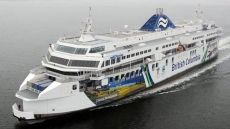CALGARY — The National Energy Board has endorsed an expansion of the Trans Mountain pipeline following a reconsideration of its impact on marine life off the B.C. coast.
The energy regulator says an increase in tanker traffic resulting from the pipeline would hurt southern resident killer whales and increase greenhouse gas emissions.
But it says those consequences can be justified in light of what would be the pipeline's benefits.
"While these effects weighed heavily in the NEB’s consideration of project-related marine shipping, the NEB recommends that the government of Canada find that they can be justified in the circumstances, in light of the considerable benefits of the project and measures to minimize the effects."
The energy board says it will impose 156 conditions on the project if it is approved. It has also made 16 new recommendations to the federal government.
Among those recommendations are measures to offset increased underwater noise and the greater chance that a whale could be hit by a ship. They also include suggestions for better spill response and reducing emissions from tankers.
The board notes that the new recommendations deal with areas outside its jurisdiction, but within the purview of the federal government.
Reaction from environmental groups was swift.
Stand.earth, which had tried unsuccessfully to widen the scope of the board's reconsideration, had said before the ruling that it expected the board to endorse the project again.
"Today's recommendation is the direct result of the Prime Minister's Office telling the NEB and federal bureaucrats to 'get to yes' on this project," Tzeporah Berman, director of the Vancouver environmental group, said in a statement.
"Scientific evidence filed with the NEB clearly shows that there is not enough data to ensure the safety of the marine environment ... and that the NEB failed to address the climate impacts of this project.
"The Trans Mountain pipeline is not in the public interest and will never be built."
Alberta has been fighting hard for the Trans Mountain expansion so that the province could move more crude oil to ports and from there to lucrative overseas markets.
The energy board's original approval of the project was set aside last summer by the Federal Court of Appeal, which said the regulator had not properly considered marine life.
The NEB's report starts the clock on a 90-day period for the federal government to decide whether the project should proceed.
Officials in Natural Resources Minister Amarjeet Sohi's office have said a final decision won't be made until consultations with affected Indigenous groups are complete.
The consultations were also an issue the federal Appeal Court raised when it put a halt on the project. It said talks with First Nations in the area had been insufficient.
The regulator's support does not guarantee restart of construction on the controversial pipeline. Sven Biggs, climate campaigner for Stand.earth, predicted before the ruling that there will be more lawsuits and delays resulting from the board's support of the project. He also said there will be protests in the streets and along the pipeline route if Ottawa decides to go ahead
Vanessa Adams, spokeswoman for Sohi, wouldn't comment on Thursday on whether a cabinet ruling could be delayed.
She said in an email the federal government wants to "achieve the required public trust" to help move resources to market by first addressing environmental, Indigenous and local concerns.
She said a 60-member consultation team in British Columbia and Alberta has met with more than 85 of 117 Indigenous groups that would be affected by a Trans Mountain expansion and more meetings are taking place daily.
A look at 16 new recommendations for Ottawa on the Trans Mountain pipeline
The National Energy Board has endorsed an expansion of the Trans Mountain pipeline. If approved by Ottawa, the regulator says it will impose 156 conditions on the project. It has also made 16 new recommendations for the federal government.
1. Develop a plan to assess the effects on the Salish Sea and a long-term strategy to manage those effects.
2. Release a public, annual report on the Salish Sea and any gaps in measures to address effects.
3. Develop a marine bird monitoring and protection program.
4. Expedite a study for establishing a Southern Strait of Georgia National Marine Conservation Area Reserve and create it if feasible.
5. Develop a program to offset increased underwater noise and increased strike risk posed to marine mammal and fish species.
6. As part of an offset program: consider slowdowns in shipping routes, limits on whale watching boats, noise reduction of ferries and incentives and requirements for quiet vessel design.
7. Review and update federal marine shipping oil spill response requirements.
8. Develop a regulatory framework for making enhanced tug escort mandatory in the Salish Sea for tankers related to the pipeline.
9. Consider a Canada/United States Transboundary Vessel Traffic Risk Assessment.
10. Develop measures to reduce greenhouse gas emissions, such as supporting the use of low-carbon alternate fuels for marine vessels and providing economic incentives for the use of energy efficient technologies.
11. Seek feedback for the Indigenous Advisory and Monitoring Committee on a marine safety system in conjunction with the Canadian Coast Guard.
12. Continue engagement with Indigenous communities, recreational boaters and vessel operators about navigation safety to prevent collisions with larger vessels.
13. Accelerate the development of the Enhanced Maritime Situational Awareness initiative and the proposed extension of the Automatic Identification System to smaller passenger vessels.
14. Look at new paths to deliver grants and contributions for financial incentives to promote innovation, such as new oil recovery technologies.
15. Have Transport Canada review federal marine oil spill compensation regimes with regards to compensation for Indigenous and non-Indigenous communities that may be impacted by a marine oil spill.
16. Develop a complaint resolution program that gathers community feedback about port-related impacts and resolves complaints about marine vessels docked at the Vancouver Fraser Port Authority managed anchorages.


